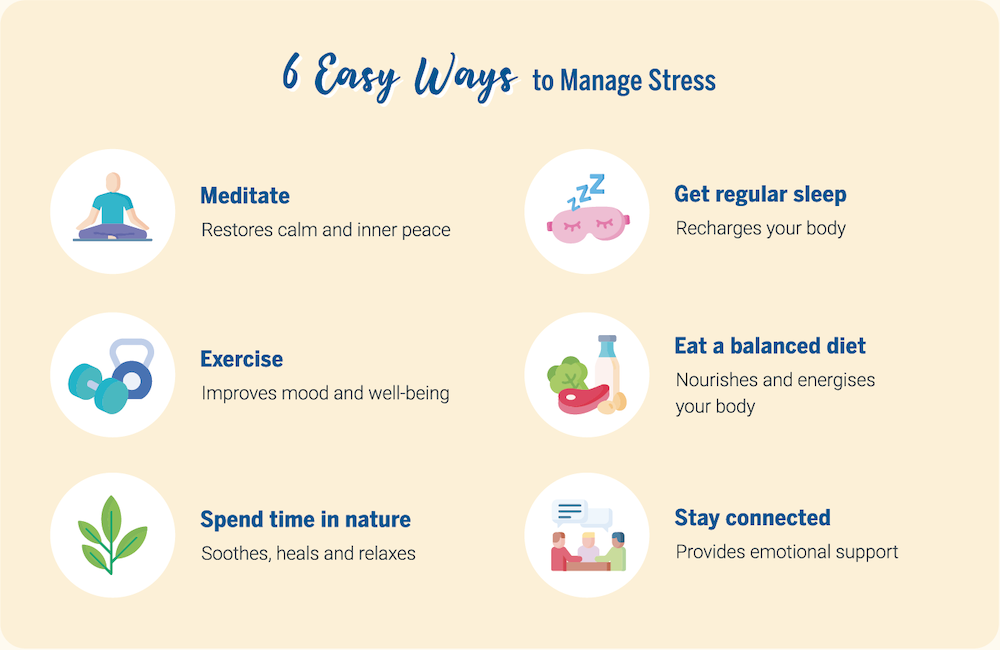News & Articles

Stress & Distress: Warning Signs & Management

Everyone experiences stress, especially when you have a busy lifestyle. Tan Hui Ping, Principal Counsellor, Allied Health shares some tell-tale signs you could be experiencing stress, and suggests some ways to manage it.
Stress is your body’s natural response to situations in your life, particularly challenging or pressuring ones.
While it can be mentally, emotionally and physically draining, it is not always a bad thing. Getting a job promotion or learning a new subject in school, for example, may be considered positive forms of stress.
However, prolonged stress can be harmful to your health and cause damage to your personal and professional life, relationships, and quality of life.
When the amount of stress you experience exceeds your ability to manage it for an extended period of time, you may experience distress.
Causes of stress and distress
We usually think of stressors as being negative. However, anything that puts high demands on you and creates situations of uncertainty can be stressful, such as planning for an overseas trip, welcoming a newborn, losing a job, or receiving a cancer diagnosis.
Distress occurs when these stressors bring about negative emotional reactions and are severe, prolonged, or both, such as in the case of financial loss, a health crisis, or death.
The experience of stress varies from individual to individual, as it depends on a number of factors including your personal worldviews, beliefs, attitudes and ability to evaluate and respond to different situations. As such, the list of causes that can result in stress for an individual is endless because they are as varied as people are.
Common warning signs of stress
Stress can slowly creep up on you and go unnoticed, especially when it is something that affects you on the daily. As your lifestyles get busier and busier, being under constant stress can start to feel normal. It is thus important to recognise some common warning signs of stress:
Physical Signs
- Aches and pains
- Rapid heart rate
- Chronic fatigue
- Falling ill easier (e.g. cold, coughs)
- Significant weight gain or loss
Cognitive Signs
- Forgetfulness
- Poor concentration
- Mental block
- Mind-racing
- Difficulty organising and making decisions
Behavioural Signs
- Crying for no particular reason
- Pacing, fidgeting or other nervous habits
- Eating more or less
- Sleeping too much or too little
- Drinking or smoking excessively
- Withdrawing from social activities
Emotional Signs
- General unhappiness
- Irritability or anger
- Fear or anxiety
- Overwhelm
- Low motivation or energy
- Loneliness or helplessness
Managing stress and distress
Stress is an unavoidable part of daily life. However, learning to identify stressors and finding ways to manage stress effectively can be beneficial for your overall well-being.
Manage stress is by practicing the 4 A’s of stress management:
- Avoid the stressor
You can avoid unnecessary stress by staying away from people and environments that make you uncomfortable. Through identifying your triggers and setting boundaries in your personal and professional life, these stressors can be eliminated.
- Alter the situation
If you cannot avoid a stressful situation, alter it. This often involves changing your approaches to stressful situations. Express your feelings and communicate your concerns to prevent resentments from building up and reduce stress. Review your ‘to-do’ list and prioritise what is important to help you take things off your plate.
- Adapt to the stressor
If you cannot alter a stressful situation, adapt to it by reframing your perspectives. Through looking at the big picture and adjusting your expectations and attitude, you can respond to stressful situations more effectively.
- Accept the things you can’t change
Some sources of stress cannot be prevented or changed. In such cases, the best way to cope with stress is to embrace the uncontrollable. Focusing on what you can control, finding the upside in major challenges, practising gratitude, and having a strong support system to rely on can help alleviate stress.
Just as there are different causes of stress for different individuals, there are different strategies for managing stress. Finding something that works for you and your body may take patience, but can be beneficial for your overall well-being in the long run.

When to seek help
While there are many ways to manage stress, there comes a point when stress becomes overwhelming and more than what you are capable of handling on your own. It is thus important to understand your own limits and recognise when you need to seek professional help.
If you experience the warning signs of stress for prolonged periods of time, and notice that it is adversely affecting your day-to-day life, talk to your doctor about it. They can offer you a number of solutions to manage your stress so you can continue to live a productive life.
Stress and the uncomfortable emotions you face are common experiences that most of us encounter daily, and you are not alone in facing them. Importantly, know that you can always reach out for help and that it is okay to do so.
| POSTED IN | Psychological Health |
| TAGS | cancer & exercise, cancer positive thinking, healthy lifestyle, stress and cancer |
| PUBLISHED | 01 September 2022 |
